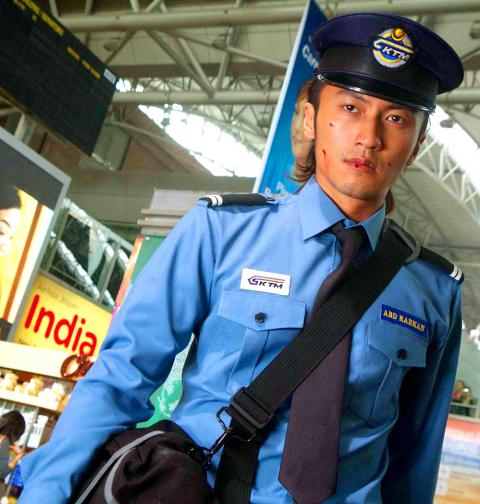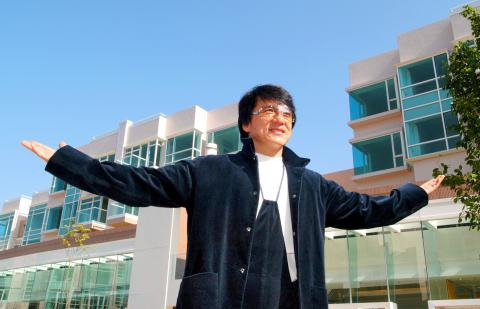Gossip rags may have to hire more staff, if Lucas Tse (謝振軒) gets his way. The eldest son of Hong Kong actors Nicholas Tse (謝霆鋒) and Cecilia Cheung (張柏芝) has been calling for their reunion.
But first, a little background. Sometime between 2003 and 2006, Cheung, demonstrating a healthy libido, performed various sexual acts on and for Edison Chen (陳冠希), who obsessively captured her explicit actions for posterity. The photos, 143 in all, were then leaked on the Internet in early 2008, “shocking” Asia’s entertainment industry and causing several public spats between Tse and Cheung, who had married in 2006.
Even though Cheung claimed that none of the photos was taken while she was with Tse, and tried to relegate the photo scandal to the dust bin of history, Tse played up the role of cuckold. The marriage, though rocky, seemed to be working itself out until last year’s airplane incident (機上事件), when Cheung and Chen were “caught” laughing and snapping photos of themselves on a flight from Taiwan to Hong Kong. Bad judgment? Perhaps. But at least they weren’t attempting to become members of the mile-high club.

Photo: Taipei Times
Fast forward to last weekend when a dinner was held in Hong Kong to hype the moderate success of Dante Lam’s (林超賢) action film The Viral Factor (逆戰), which stars Tse and Jay Chou (周杰倫). When asked by the assembled media about his children, Tse said he had visited them several times over the Lunar New Year holiday and plans to spend as much time with them while in Hong Kong. And it seems that he is now on speaking terms with Cheung, or as a Sina.com article emphasized, his “ex-wife.”
“My ex-wife says that Lucas sheds tears any time he sees me smacked around” on the big screen, Tse said — the same reaction he had when he saw his father, veteran actor Patrick Tse (謝賢), endure similar treatment.
Nicholas Tse confirmed that Lucas has been pressuring him to reconcile with Cheung. “But we don’t talk about it all day,” he said. Besides, he added, “In this day and age, divorce is not really a big deal.” Hmmm, not the most encouraging words in the run-up to Valentine’s Day. So, will Tse reunite with his “ex-wife”? Are dragons real?

Photo: Taipei Times
The same Sina.com story reported that Jay Chou’s mother has been “volunteering” at his recently opened restaurant; a less than subtle reference to disgraced Taiwanese diplomat Jacqueline Liu (劉姍姍), who was charged last year for overworking and underpaying her employees. Chou said he wasn’t forcing his mother to work there, and that she was glad to help out at the fabulously popular restaurant. He added that his role in The Viral Factor inspired him to open a toy gun store, a business plan that his mother immediately put the kibosh on.
Does The Chairman, as Chou is called, always seek his mother’s advice, even when it comes to girlfriends? You bet. And that’s probably one of the reasons why he’s so successful. He declined to comment on his mother’s feelings towards teenage model Hannah Quinlivan (昆凌), the singer’s rumored squeeze.
Meanwhile, Edison Chen has been leading a healthier lifestyle. The United Daily News reported that over the past four months he went to bed at 10pm and woke up at 5am to train for the Nomad Run, a charity marathon that he completed over the weekend.
The Apple Daily, in an article cynically headlined “Dirty boy tries to wipe slate clean in marathon atonement” (陳冠希跑完42公里馬拉松 淫郎肖想變善男), wrote that the Hong Kong singer-actor finished the 42km race in under four hours, which isn’t bad. He raised NT$3.8 million for the Changing Young Lives Foundation (成長希望基金會), a Hong Kong-based charity organization, and proved that his star power hasn’t waned.
When asked if the charity run was his attempt to gain public sympathy, Chen said, “This is a charity. What slate has to be cleaned?” He added that he plans to release two Mandarin albums and a Cantonese album this year, while continuing to do charity work.
Kudos to Chen for raising money for the disadvantaged. But it’s small potatoes in comparison to the cash Jackie Chan (成龍) forked out for a luxury jet. NOWnews reported that the Hong Kong action star, who has a personal fortune worth US$130 million (NT$3.8 billion) according to celebritynetworth.com, bought the US$30 million (NT$900 million) aircraft from Embraer, a Brazilian manufacturer.
At an unveiling ceremony, a giddy Chan said he was pleased to be the first person from China to own the “quiet and luxurious” aircraft. He added that he is “very honored to join the [Embraer] family as a user and spokesman.” Discount anyone?
The plane, which has Jackie and the Chinese character for dragon painted on its tail, comes equipped with three cabins, a kitchen with appliances, noise reduction equipment, chairs made with genuine leather, the latest in telecommunications equipment and the biggest bathroom of its class.

In the March 9 edition of the Taipei Times a piece by Ninon Godefroy ran with the headine “The quiet, gentle rhythm of Taiwan.” It started with the line “Taiwan is a small, humble place. There is no Eiffel Tower, no pyramids — no singular attraction that draws the world’s attention.” I laughed out loud at that. This was out of no disrespect for the author or the piece, which made some interesting analogies and good points about how both Din Tai Fung’s and Taiwan Semiconductor Manufacturing Co’s (TSMC, 台積電) meticulous attention to detail and quality are not quite up to

April 21 to April 27 Hsieh Er’s (謝娥) political fortunes were rising fast after she got out of jail and joined the Chinese Nationalist Party (KMT) in December 1945. Not only did she hold key positions in various committees, she was elected the only woman on the Taipei City Council and headed to Nanjing in 1946 as the sole Taiwanese female representative to the National Constituent Assembly. With the support of first lady Soong May-ling (宋美齡), she started the Taipei Women’s Association and Taiwan Provincial Women’s Association, where she

Chinese Nationalist Party (KMT) Chairman Eric Chu (朱立倫) hatched a bold plan to charge forward and seize the initiative when he held a protest in front of the Taipei City Prosecutors’ Office. Though risky, because illegal, its success would help tackle at least six problems facing both himself and the KMT. What he did not see coming was Taipei Mayor Chiang Wan-an (將萬安) tripping him up out of the gate. In spite of Chu being the most consequential and successful KMT chairman since the early 2010s — arguably saving the party from financial ruin and restoring its electoral viability —

It is one of the more remarkable facts of Taiwan history that it was never occupied or claimed by any of the numerous kingdoms of southern China — Han or otherwise — that lay just across the water from it. None of their brilliant ministers ever discovered that Taiwan was a “core interest” of the state whose annexation was “inevitable.” As Paul Kua notes in an excellent monograph laying out how the Portuguese gave Taiwan the name “Formosa,” the first Europeans to express an interest in occupying Taiwan were the Spanish. Tonio Andrade in his seminal work, How Taiwan Became Chinese,